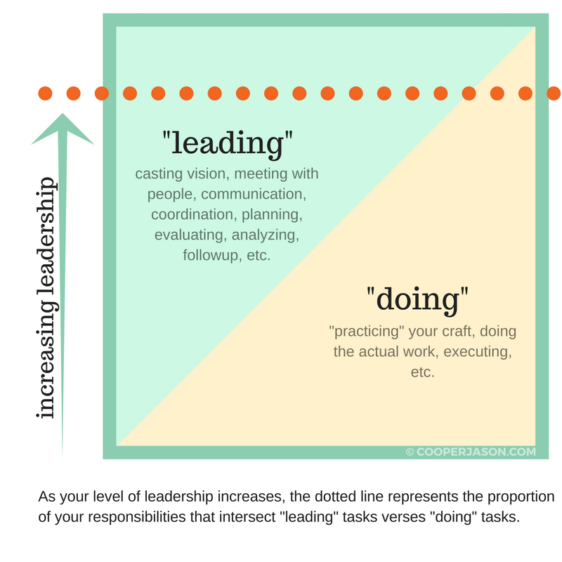At some point you realize, leading people can be boring. Here’s how it happens.
Most people enter a career field because they love, or at least believe they will love, their craft. Doesn’t matter if it is programming, designing, video production, marketing, construction, IT, web, finance, etc.
And if you do well you will likely find yourself being promoted in some fashion. It may simply be a raise and being trusted with more significant projects. As leadership responsibility increases, tasks decrease. That’s a bit misleading, because you still have tasks, but you are no longer employed for your skill in your field, but rather for you ability to lead other people with the same skill (or related skills).
So as leadership responsibility increases, your opportunity to practice your craft decreases. The very thing that likely drew you into your field and allowed you to advance is now a waning part of your work tasks.
Welcome to leadership!
It’s the leading verse doing trade off.
Leading people means less “doing.”
Obviously you are still doing. It’s just that you are doing different things…things that you probably weren’t trained for. It’s not boring because you have nothing to do, it’s just that you find yourself practicing your craft less and less. This chart helps explain.
This is why people skills are very valuable.
This is why how you treat people will impact your potential for leadership more than anything.
There are always exceptions. There are people who end up in leadership positions because of their skills, but they aren’t good leaders. And there are people in leadership who advanced in ways other than by being good at their craft (the owner’s son or daughter, someone who “knows” the right person, etc.).
And there are leaders who have advanced in their careers, but dread going to work because they miss the doing side so much.
6 Ways to combat leadership boredom.
- Roll up your sleeves and jump in on the occasional work project. You can’t do this a lot, but occasionally, it’s fine. Take on one or more of the deliverables that will require you to “practice” your craft. It’s OK. You are the boss.
- Practice your craft as your hobby. Do freebies for friends or some freelancing.
- Volunteer your skill at your church or for a non-profit. There are many organizations out there that impact the community in a meaningful way but cannot afford to hire a full time person with your particular skill. Why not donate some of your time?
- Do hands on mentoring with a teenager or college student. Teach someone else your skill set. This may be informally through natural relationships, or formally through classes and workshops.
- Plan time weekly to stay on top of your craft – reading current trends, blogs, thought leaders, even practicing in a “sand box.”
- Blog. Blogging is really a way to mentor or teach from a distance but on your own schedule. Write helpful blog articles about your craft.
-What do you do to keep up with your craft?







